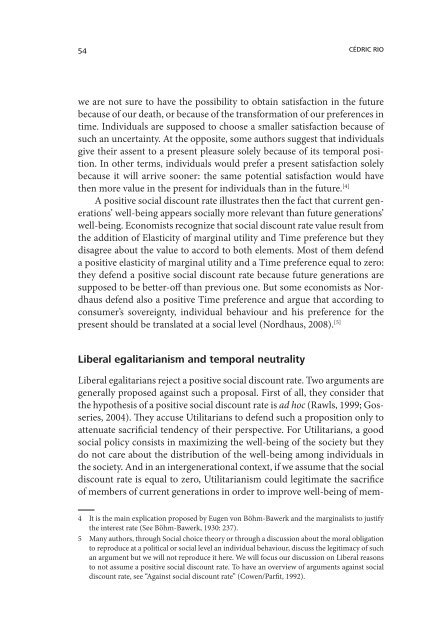Diacritica 25-2_Filosofia.indb - cehum - Universidade do Minho
Diacritica 25-2_Filosofia.indb - cehum - Universidade do Minho
Diacritica 25-2_Filosofia.indb - cehum - Universidade do Minho
Create successful ePaper yourself
Turn your PDF publications into a flip-book with our unique Google optimized e-Paper software.
54<br />
CÉDRIC RIO<br />
we are not sure to have the possibility to obtain satisfaction in the future<br />
because of our death, or because of the transformation of our preferences in<br />
time. Individuals are supposed to choose a smaller satisfaction because of<br />
such an uncertainty. At the opposite, some authors suggest that individuals<br />
give their assent to a present pleasure solely because of its temporal position.<br />
In other terms, individuals would prefer a present satisfaction solely<br />
because it will arrive sooner: the same potential satisfaction would have<br />
then more value in the present for individuals than in the future. [4]<br />
A positive social discount rate illustrates then the fact that current generations’<br />
well-being appears socially more relevant than future generations’<br />
well-being. Economists recognize that social discount rate value result from<br />
the addition of Elasticity of marginal utility and Time preference but they<br />
disagree about the value to accord to both elements. Most of them defend<br />
a positive elasticity of marginal utility and a Time preference equal to zero:<br />
they defend a positive social discount rate because future generations are<br />
supposed to be better-off than previous one. But some economists as Nordhaus<br />
defend also a positive Time preference and argue that according to<br />
consumer’s sovereignty, individual behaviour and his preference for the<br />
present should be translated at a social level (Nordhaus, 2008). [5]<br />
Liberal egalitarianism and temporal neutrality<br />
Liberal egalitarians reject a positive social discount rate. Two arguments are<br />
generally proposed against such a proposal. First of all, they consider that<br />
the hypothesis of a positive social discount rate is ad hoc (Rawls, 1999; Gosseries,<br />
2004). Th ey accuse Utilitarians to defend such a proposition only to<br />
attenuate sacrifi cial tendency of their perspective. For Utilitarians, a good<br />
social policy consists in maximizing the well-being of the society but they<br />
<strong>do</strong> not care about the distribution of the well-being among individuals in<br />
the society. And in an intergenerational context, if we assume that the social<br />
discount rate is equal to zero, Utilitarianism could legitimate the sacrifi ce<br />
of members of current generations in order to improve well-being of mem-<br />
4 It is the main explication proposed by Eugen von Böhm-Bawerk and the marginalists to justify<br />
the interest rate (See Böhm-Bawerk, 1930: 237).<br />
5 Many authors, through Social choice theory or through a discussion about the moral obligation<br />
to reproduce at a political or social level an individual behaviour, discuss the legitimacy of such<br />
an argument but we will not reproduce it here. We will focus our discussion on Liberal reasons<br />
to not assume a positive social discount rate. To have an overview of arguments against social<br />
discount rate, see “Against social discount rate” (Cowen/Parfi t, 1992).<br />
<strong>Diacritica</strong> <strong>25</strong>-2_<strong>Filosofia</strong>.<strong>indb</strong> 54 05-01-2012 09:38:20











![Programa [pdf] - cehum - Universidade do Minho](https://img.yumpu.com/17305425/1/190x135/programa-pdf-cehum-universidade-do-minho.jpg?quality=85)




